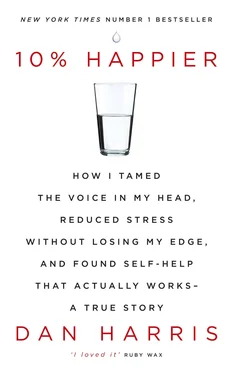The opening speaker was a woman in her fifties named Tara Brach. She had long brown hair and pleasant Semitic features. She was holding forth in a creamy, cloying tone. The style was astonishingly affected—artificially soft and slow, as if she were trying to give you a Reiki massage with her voice. She exhorted us to love ourselves, “invited” us to close our eyes and “trust in the ocean-ness, in the vastness, in the mystery, in the awareness, in the love—so that you could really sense, ‘Nothing is wrong with me.’ ” I couldn’t bear to look over at Jason, who I imagined must be silently cursing my name. Brach closed with a poem, then a dramatic pause and, finally, a self-serious, sotto voce “Thank you.”
Then Mark jumped in and saved the night. “Well, I’m gonna give you a slightly different perspective,” he said, with a mischievous glint in his eye, “which is that, actually, there’s plenty still wrong with me.” People started laughing, and a tight smile came over Tara’s face. Jason, who’d seemed oddly detached—but not in a Buddhist way—sat up in his seat.
“People come to me a lot feeling like they ought to be loving themselves, and I actually counsel against it,” he said. His delivery was off-the-cuff and shtick-free. In stark contrast to Brach, he argued that we needed to actively get in touch with our ugly side. “Mindfulness gives us a way to examine our self-hatred without trying to make it go away, without trying to love it particularly.” Just being mindful of it, he said, could be “tremendously liberating.”
The idea of leaning into what bothered us struck me as radical, because our reflex is usually to flee, to go buy something, eat something, or get faded on polypharmacy. But, as the Buddhists say, “The only way out is through.” Another analogy: When a big wave is coming at you, the best way not to get pummeled is to dive right in. This jibed with what I had learned through my own painful, public experience after returning from Iraq, using drugs, and losing my mind on television; when you squelch something, you give it power. Ignorance is not bliss.
Mark’s thesis was a direct response to the fears Jason and my comedy writer friend had about meditation leaving them without an edge. If anything, mindfulness brought you closer to your neuroses, acting as a sort of Doppler radar, mapping your mental microclimates, making you more insightful, not less. It was the complete opposite of the reckless hope preached by the self-helpers. It was the power of negative thinking.
As I sat there in the audience, I was feeling proud of Mark, increasingly enthralled with the theory of mindfulness—and hopelessly frustrated by my inability to put it to work.
To my profound surprise, the person who unlocked this mystery for me was Tara Brach.
Driven by some unfathomable masochistic urge, and even though I knew Mark wouldn’t be speaking, I had dragged myself back to the ballroom for the second day of the conference. At first, Brach was driving me nuts with all of her ostentatious head-bowing, bell-ringing, and Namaste-saying. But then she redeemed herself.
She nailed the method for applying mindfulness in acute situations, albeit with a somewhat dopey acronym: RAIN.
R: recognize
A: allow
I: investigate
N: non-identification
“Recognize” was self-explanatory. Using my David Westin example, in those moments after our—even in the best light—quite ambivalent meeting, job number one was simply to acknowledge my feelings. “It’s like agreeing to pause in the face of what’s here, and just acknowledge the actuality,” said Brach. The first step is admitting it.
“Allow” is where you lean into it. The Buddhists were always talking about how you have to “let go,” but what they really meant is “let it be.” Or, as Brach put it in her inimitable way, “offer the inner whisper of ‘yes.’ ”
The third step—“investigate”—is where things got truly practical. Sticking with the Westin example—after I’ve acknowledged my feelings and let them be, the next move would be to check out how they’re affecting my body. Is it making my face hot, my chest buzzy, my head throb? This strategy sounded intuitively correct to me, especially given that I was a guy whose undiagnosed postwar depression had manifest itself in flulike symptoms.
The final step—“non-identification”—meant seeing that just because I was feeling angry or jealous or fearful, that did not render me a permanently angry or jealous person. These were just passing states of mind.
The Brach Plan seemed eminently workable to me. And as grating as she’d seemed at first, I now found something comforting about her manner. She was, after all, a trained professional—in both Buddhism and psychotherapy—who had spent her life helping people. I realized, with a hot blast of self-directed opprobrium that, yet again, I had been unfair.
Just a few weeks later, I put her advice to work, and got behind the waterfall.
I was having a bad day. I was worrying again about whether I’d get the promotion—and then beating myself up for said worrying. I hit the couch in my office again, but this time I tried Brach’s RAIN technique, especially the bit about investigating how my inner turmoil was playing out physically.
Noting: chest buzzing.
Head pounding.
Flophouse in Duluth in six months, guaranteed.
Noting: worrying.
Chest buzzing, pounding.
Earlobes hot.
I didn’t try to stop it; I just felt it. I was “allowing,” “letting be,” and “investigating.”
Buzzing. Tension. Buzzing.
I’m doing it! I’m being mindful of my angst!
Noting: self-congratulation.
The effect was something like the picture-in-picture feature on a television. Normally, my mental clatter dominated the whole screen. When I pressed the mindfulness button, though, I had some perspective. My thoughts were playing out in a larger space, and while they still burned, they burned a little less. The process felt, in a sense, journalistic. (Or at least it conformed to what we reporters tell ourselves we are: objective, dispassionate—fair and balanced, if you will.)
It was a revelation: the voice in my head, which I’d always taken so seriously, suddenly lost much of its authority. It was like peering behind the curtain and seeing that the Wizard of Oz was a frightened, frail old man. Not only did it ease my agita in the moment, but it suddenly imbued me with a sense of hope about better handling whatever garbage my ego coughed up going forward.
A success, yes—but I still had questions. While mindfulness was clearly very powerful, it nonetheless did not erase my real-world problems. So what had really changed? I added a new entry into a file I had created on my BlackBerry, labeled “Questions for Mark.”
We were back at the Tribeca Grand, where I had talked Mark into meeting me for another beer summit. As he kicked off his man-clogs and folded his legs up under his butt on his chair, I was reminded of what an odd pair we made. Before I could even get to my questions, I noticed that he had an eager look on his face that clearly signaled he had something he wanted to tell me.
He then mentioned with a conspiratorial grin that he’d just come from a prescheduled phone meeting with Tara Brach. She’d requested they talk; she was not happy with his contradicting her onstage. Mark managed to relate this juicy little nugget without seeming mean-spirited. I argued strenuously that his obligation was not to her but to the audience. He seemed appreciative. In any event, he and Brach had apparently smoothed it all out in the end.
When I launched into my question about whether mindfulness left you flaccid in the face of life’s thorny problems, he circled right back to the Brach incident.
Читать дальше












